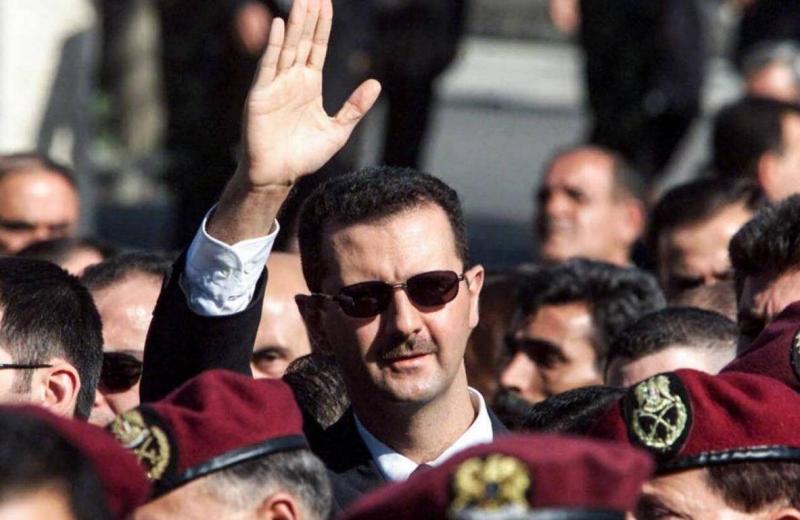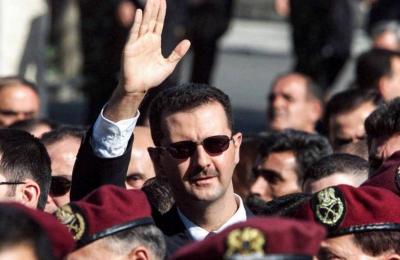Despite the differing stance of the Syrian government regarding the movement of "Hamas" compared to its relationship with "Hezbollah" and its common ally Iran, observers and experts dismiss the possibility of Damascus changing its strategy that has been in place since October 7, should the conflict escalate further in southern Lebanon. Currently, attention is focused on the nature of the "response" that Israel will implement against "Hezbollah" after accusing it of being behind the attack in Majdal Shams in the Golan Heights, which resulted in the deaths of 12 children and teenagers.
As the language of threat and "harm" looms from Israeli officials, questions arise about the behavior that Bashar al-Assad and his regime in Damascus will take, and the scenarios for its development or adherence as has prevailed during the months of the Gaza war. Since the outbreak of the war in Gaza last October, the regime's narrative has been limited to condemnation and affirming stances, avoiding threats or even hinting at opening fronts in the "Syrian arena" within the framework known for years as the "Unity of Resistance Arenas."
After the attack on the Iranian consulate in Damascus and the Iranian response, there was no change in its routine behavior, which is based on denunciation and addressing UN institutions. The attack in Majdal Shams, which "Hezbollah" distanced itself from, is the latest episode of escalation related to the Gaza war and represents a "turning point" in the remote confrontation Israel has been waging with "Hezbollah" over the past months.
While the Syrian Foreign Ministry issued a statement condemning what it described as the "hideous crime" in Majdal Shams and the attempts to escalate and widen the "circle of aggression," it did not indicate its intention to take further steps, either on the ground or in the corridors of international institutions. Lebanese military analyst, retired Brigadier General Khaled Hamada, considered the statement from Damascus to be "political," indicating the Syrian regime's position on the ongoing conflict. He noted to "Al-Hurra" that the statement was also a "form of political alignment." He added, explaining: "The attempt to put the aggressor in front of the international community was a routine obligation that the Syrian government did not perform. It did not act according to the simplest rules of national responsibility."
**"Between Two Allies and Two Perspectives"**
The Syrian regime receives support from Iran, the leading figure of what is known as the "Axis of Resistance," a long-standing and prominent ally of "Hezbollah" in Lebanon, which has engaged with it in military confrontation on the ground against opposition factions since 2011. Conversely, it receives support from Russia, a distant country that has not taken many public stances regarding the events and developments related to the Gaza war compared to its counterparts in the West.
Two days before the attack in Majdal Shams, Bashar al-Assad arrived in Moscow, and after his meeting with Russian President Vladimir Putin, the latter stated that "unfortunately, matters tend to worsen in the region. This also applies directly to Syria." While Putin mentioned "trade and economic relations and promising trends in this regard," his words carried an indication of Moscow's attempt to steer Syria away from the raging fire, aiming to push it toward stability. However, only two months before the meeting between Assad and Putin, the Syrian president visited Tehran, where after offering condolences for the death of Iranian President Ebrahim Raisi, he received reminder messages from Iranian Supreme Leader Ali Khamenei.
These messages emphasized "Syria as a resistant state" and the need to preserve its "identity," indicating attempts to exclude it from the "regional equations" with promises "that they will never fulfill." Although Iran's perspective on Syria differs from Russia's view regarding what Putin told Assad and what Khamenei reminded him of, Aaron Lund, an expert on Syrian affairs at the Century Foundation, sees the scene not as a "conflict," but rather as a certain "divergence of interests." He explains: "Neither Tehran nor Moscow wants a major conflict with Israel, even if they may differ in how willing they are to push Syria to remain involved if such a conflict erupts anyway."
In other words, the researcher adds, "Moscow and Tehran are interested in keeping Assad in power, but they may differ in the level of risks they are willing to bear when other interests come into play."
**What About "Hezbollah"?**
"Hezbollah" became involved in military operations supporting the Syrian regime against its opponents after 2011, deploying armed fighters and senior leaders, many of whom were killed in various Israeli strikes after the Gaza war and even before it. Before 2011, what characterized the regime in Damascus and "Hezbollah" in Lebanon was the support and weaponry that the former provided to the latter during its war with Israel in 2006.
Although the circumstances are different currently regarding the spark that brought "Hezbollah" into confrontation with Israel, the perspective toward Damascus's stance seems fundamental, according to those who spoke to "Al-Hurra." For Iran, the survival and success of "Hezbollah" are critically important, but Russia would primarily seek to avoid direct involvement in conflict, according to researcher Lund. However, in the end, Lund does not believe that Assad "is under the control of either party," referring to the Russians and the Iranians.
He might not be able to control what his allies do on Syrian land and in the Syrian airspace in the event of a major crisis, but "he is capable of controlling his regime.. and his primary interest now is to ensure his survival," according to the expert on Syrian affairs at the Century Foundation. The Syrian position is unlikely to deviate from the strategy followed in managing issues and crises; Syria is at the heart of the storm, and it can only be in that position, paying the price for its alignment in the Axis of Resistance.




